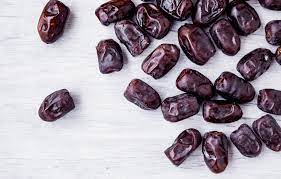Dates, often referred to as nature’s candy, are not only delicious but also packed with essential nutrients. These small, sweet fruits offer a range of potential health benefits that make them a valuable addition to your diet. In this article, we’ll explore seven potential health benefits of dates.
1. Rich in Nutrients: Dates are a powerhouse of vitamins and minerals. They are a good source of potassium, magnesium, vitamin B6, and fiber, contributing to overall health and vitality.
2. Natural Energy Boost: Due to their high carbohydrate content, dates are an excellent source of natural energy. Their combination of glucose, fructose, and fiber provides a sustained release of energy, making them a perfect snack to fuel your active lifestyle.
3. Digestive Health: The fiber in dates supports digestive health by promoting regular bowel movements and preventing constipation. It also aids in maintaining a healthy gut microbiome, which is essential for overall well-being.
4. Bone Health: Dates contain minerals like calcium, magnesium, and phosphorus, which are crucial for maintaining strong and healthy bones. Regular consumption may help reduce the risk of osteoporosis.
5. Heart Health: Potassium in dates can help regulate blood pressure and support heart health. Additionally, their fiber content may contribute to lower cholesterol levels and reduce the risk of heart disease.
6. Antioxidant Properties: Dates are rich in antioxidants, including flavonoids and carotenoids. These compounds help neutralize harmful free radicals in the body, reducing oxidative stress and supporting cellular health.
7. Natural Sweetener: Dates can be used as a healthier alternative to refined sugars in various recipes. Their natural sweetness makes them a great option for satisfying your sweet cravings without causing rapid spikes in blood sugar levels.
Conclusion: Incorporating dates into your diet can offer a wide range of potential health benefits, from providing sustained energy to supporting bone health and heart function. Whether enjoyed as a snack, added to smoothies, or used in cooking, dates are a nutrient-packed superfood worth including in your daily meals.
FAQs:
Q1: How many dates should I eat daily? A: There is no specific quantity set in stone. Moderation is key; consuming a few dates as part of a balanced diet can offer their benefits without excessive sugar intake.
Q2: Can dates help with weight management? A: While dates are calorie-dense due to their natural sugars, they can still be included in a weight-conscious diet when consumed in moderation and as part of a well-rounded eating plan.
Q3: Are there any side effects of eating too many dates? A: Dates are nutritious, but their natural sugars can contribute to excessive calorie intake if consumed excessively. Individuals with diabetes should monitor their blood sugar levels when consuming dates.
Q4: Can dates be part of a gluten-free diet? A: Yes, dates are naturally gluten-free and can be a great option for those following a gluten-free diet.
Q5: How should dates be stored to maintain their freshness? A: Store dates in a cool, dry place or in the refrigerator to extend their shelf life. You can also freeze them for long-term storage.








